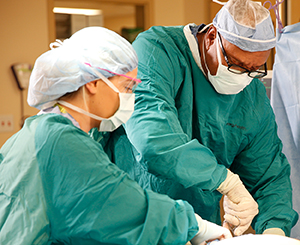Adrenal Cancer: Surgery
Adrenal Cancer: Surgery

Types of adrenal cancer surgery
Removing the adrenal gland may be done in 2 ways:
Open surgery. A large cut or incision is made in the skin. Where the incision is depends on the size of the tumor and whether the cancer has spread. For small tumors, the incision may be made in the back, just below the ribs. For larger cancers, the incision is made in the front of the belly. This is more common because it's easier to see the adrenal gland and the tissues around it. So the doctor can find and remove areas of cancer spread. It also allows the doctor to reach both adrenal glands through 1 incision.
Laparoscopy. This type of surgery may be used if the tumor is small. It’s done through several small incisions with a thin, flexible tube called a laparoscope. The laparoscope has a light and camera. The scope is put into 1 incision so the doctor can see the area on a computer screen. Long, thin tools are then put into the other incisions to take out the tumor.
Risks of adrenal cancer surgery
All surgery has risks. The risks of adrenal cancer surgery include:
Excess bleeding
Infection
Damage to nearby organs
Organs bulging under the incision (incision hernia)
Blood clots
Your risks depend on your overall health, the type of surgery you need, and other factors. Talk with your healthcare provider about which risks apply most to you. Also ask about what side effects you might expect.
Getting ready for your surgery
Your healthcare team will talk with you about the surgery options that are best for you. You may want to bring a family member or close friend with you to appointments. Write down questions you want to ask about your surgery. Make sure to ask about:
What type of surgery will be done
What will be done during surgery
The risks and possible side effects of the surgery
When you can return to your normal activities
If the surgery will leave scars and what they will look like
What types of hormone imbalances you can expect and how they'll be treated
Before surgery, tell your healthcare team if you are taking any medicines. This includes over-the-counter medicines, prescription medicines, vitamins, herbs, and other supplements. This is to make sure you’re not taking medicines that could affect the surgery. After you have discussed all the details with the surgeon, you will sign a consent form. This says that the healthcare provider can do the surgery.
You’ll also meet the anesthesiologist. This is the doctor who will give you medicine drugs (called anesthesia) during surgery so you're in a deep sleep and don't feel pain. You can ask questions about the anesthesia and how it will affect you. Just before your surgery, an anesthesiologist or a nurse anesthetist will give you the anesthesia.
After your surgery
You may have to stay in the hospital for 2 to 7 days. This will depend on the type of surgery you had. For the first few days after surgery, you are likely to have pain from the incision. Your pain can be controlled with medicine. Talk with your healthcare provider or nurse about your pain relief options. Some people don’t want to take pain medicine. But taking medicine can help your healing. If you don’t control pain well, you may not want to cough or turn over often. But you need to do these things as you recover from surgery.
You may have constipation from using some pain medicine, from not moving much, or from not eating much. Talk with your healthcare provider or nurse about getting more dietary fiber or using a stool softener.
You may feel tired or weak for a while. The amount of time it takes to recover from surgery will vary for each person.
A certain type of adrenal cancer (called pheochromocytoma) may release a lot of active hormones during or after surgery. You will be watched closely for any high blood pressure problems.
You may need to begin taking some form of hormone replacement after surgery. You might need to do this for the rest of your life.
Recovering at home
When you get home, you may get back to light activity. But you should avoid strenuous activity for 6 weeks. Your healthcare team will tell you what kinds of activities are safe for you while you recover.
Follow-up care
You may need more treatment after surgery. Your healthcare provider will talk with you about this.
If you need to take hormone therapy after surgery, you may need to be followed by an endocrinologist. He or she will manage any changes needed in your medicine. An endocrinologist is a doctor who specializes in treating disorders of the hormone (endocrine) system.
When to call your healthcare provider
Let your healthcare provider know right away if you have any of these problems after surgery:
Bleeding
Redness, swelling, or fluid leaking from the incision
Fever
Chills
Talk with your healthcare provider about what other problems to watch for and when to call them. Know what number to call with questions, including after office hours, on weekends, and on holidays.
Updated:
May 11, 2018
Reviewed By:
Gersten, Todd, MD,Image reviewed by StayWell art team.,LoCicero, Richard, MD,Stump-Sutliff, Kim, RN, MSN, AOCNS